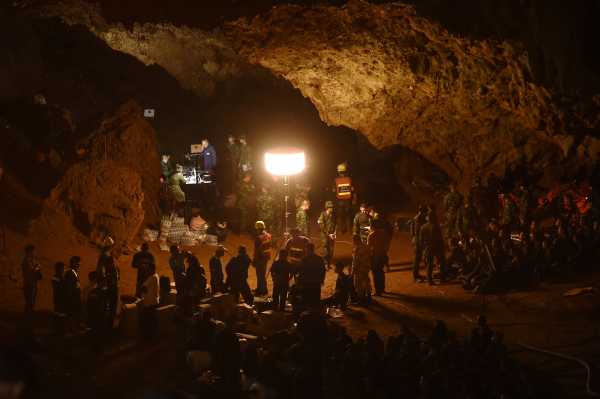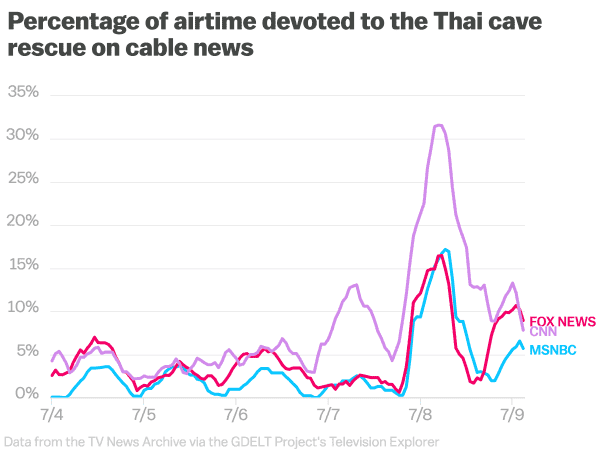
This week, the saga of the 12 Thai boys trapped in a flooded cave came to a miraculous conclusion. After more than two weeks stuck in a dark, flooded cave, all 12 boys, ages 11 to 16, and their coach, are safe.
It wasn’t a perfect happy ending, though. One Thai Navy SEAL died during the rescue operation. And it’s unknown what lasting harm has been done to the boys’ physical or mental health.
Throughout the saga, people around the world were gripped by the story. And TV networks devoted a sizable amount of their airtime to the story, as revealed in this analysis by Vox’s Alvin Chang.

I was probably not alone in feeling a bit uneasy about all the interest.
We were fixating on what was very likely a traumatic experience for these young people, turning it into round-the-clock entertainment. I now feel anxious for these boys, who are unwitting celebrities, worried that the attention still to come will exacerbate whatever trauma they underwent in the dark.
I also felt uneasy because of a frustrating bias in humans. We tend to care more about dramatic tragedies that strike a relatively small number of people, and grow numb to the slow, ongoing horrors that inflict millions. Twelve boys were trapped in a cave, yes. But there are millions of children living in war zones.
Related
A psychologist explains the limits of human compassion
Certainly there are children all around the world trapped in scary situations who desperately need help. Where’s the round-the-clock news cycle for them?
On the other hand: “The boys in the cave” was an obviously compelling story. It’s filled with the elements that make for great dramas. It’s showing the best in people, the best in rescue workers, who risked their lives to save the team. The rescue operation was an impressive international collaboration; it’s a story that makes you feel proud of the resilience of humans, the generosity of strangers, and the can-do attitude of a community in crisis.
To help sort through these conflicting feelings, I called up Tim Recuber. He’s a sociologist at Smith College who studies, and has published a book on, how American media respond to crisis, death, and disaster. The basic question I wanted to ask him: Why do we get so glued to watching human trauma and drama unfold on TV? And is it okay if we tune in?
This conversation has been edited for length and clarity.
Brian Resnick
You use a really intriguing term to describe the appeal of watching disasters (and potential disasters) — “empathetic hedonism.” What is it, and why is it a motivating factor keeping people glued to their TVs for disaster or trauma coverage?
Tim Recuber
There’s a certain kind of pleasure in really feeling for someone else, even if those feeling are bad. That’s what that term is trying to name.
In a culture that tries to venerate empathy, being able to say, “I saw that footage, it’s really horrible, I feel horrible for those kids” … it does mark you as a moral person. That tends to be valuable today [to be seen as] an empathetic person. People get to demonstrate they have this ability.
Brian Resnick
So it’s empathetic in the sense that we grow attached to narratives. There’s human emotions involved, and we can imagine what it might feel like to be trapped in a cave. But it’s hedonistic because we enjoy watching these things, sharing these things, talking about them?
Tim Recuber
Yeah. And you never can fully do it. I can convince myself that I can understand what someone else went through. But I don’t really know that’s the case. So there’s always a sense you can always learn more, always watch more coverage.
The speed and intimacy at which we can understand these [stories] is new, and ever increasing. That helps the appeal of these kinds of stories, you can keep refreshing the hashtag, and keep finding new stuff, and be transported into people’s lives that you couldn’t 10 or 20 years ago.
Brian Resnick
How should we feel about that, that it’s entertaining to watch horrible things unfold? How should we think through the morality of empathetic hedonism?
Tim Recuber
People tend to be critical of this. There’s a knee-jerk response that it’s wrong. But I tend to be heartened by the fact that people care deeply about others who are different from them.
I think empathy has a lot of problems, and at times, our attention might be better focused elsewhere. When you talk to people who watch this stuff, they’re upset, they’re worried, they hope everything turns out okay. I don’t see the harm in caring about kids who are trapped in a really scary place.
Related
The case against empathy
Brian Resnick
What do you mean by, “I think empathy has a lot of problems?”
Tim Recuber
Empathy is really partial. We’re more inclined to be empathetic to people who we feel are like us. Identifiable victims, relatable victims. And oftentimes racial, class, and gender biases get in the way of empathetic identification. There are even studies that show that people viewing a person’s skin being pricked by a needle will have more of a [physiological] reaction when the skin is the same color as theirs.
Brian Resnick
In that view, I guess, it’s really nice that many Americans are caring about a group of boys who don’t look much like them.
Tim Recuber
The status of children is trumping any kind of ethnic biases. People are hearing about kids in a dark scary place. And it strikes a chord. I’d rather it did strike a chord than it didn’t.
Brian Resnick
I hear that. People are caring.
But is there a line where when hedonistic empathy becomes something more sinister? The example I’m thinking of is people going to a gladiator match. There’s a morbid fascination.
Tim Recuber
There’s always a small number of people tuned into disasters like this hoping for the worst or with an ironic detached attitude. Those people exist. Those tend to be slim amounts of people.
The novelty and the spectacle of the thing is typically a draw too. That’s apart of the appeal of disasters. If you think of people obsessively watching videos of the [Japanese] earthquake and tsunami in 2011, part of the appeal was just watching something they’d never seen before.
Brian Resnick
You have any advice for reporters covering this story, or similar ones in the future?
Tim Recuber
First, the first reports in a disaster are the least reliable.
And then, respecting the victim, and giving the victims space, and letting the victims decide if they want to be on camera. And oftentimes victims do [want to be on camera].
Just look at the Parkland High School shooting kids. They wanted to have a say. But if you look at the Virginia Tech shooting a decade before it, those kids had cameras thrust into their faces as they were coming out of classrooms. A few days after the shooting there were signs all over the campus saying “media stay away.”
Brian Resnick
Empathy is not an invitation for invading privacy.
Tim Recuber
Exactly.
Sourse: vox.com






